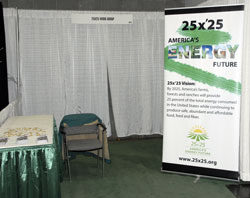It’s not just American alternative fuels seeing a boost from President Bush’s State of the Union speech last night when he pledged to reduce U.S. gasoline consumption by 20 percent in the next 10 years. Check out this story from Dow Jones posted on CattleNetwork.com:
Michael McNamara, London-based senior equities analyst for Jefferies International, said European stocks are indirectly benefiting from “improved sentiment“ in Bush’s State of the Union address late Tuesday. “The specific mention of ethanol and biodiesel is good news,“ McNamara said.
“But we generally consume ethanol in the market where we produce it, so while this is good for sentiment, it’s more important for E.U. member states to mandate increased biodiesel or ethanol use.“
The U.S. energy proposal calls on Congress to require the use of 35 billion gallons of ethanol and other alternative fuels such as biodiesel by 2017. The ethanol would be in gasoline blends of 10% to 85%.
“It’s not certain what exact measures will be put in place and the financial impact they will have, but the largest market in the world is laying out its desire to reduce gasoline consumption by 20%,“ McNamara said.
“It is clearly a sign that G-8 governments are increasingly getting behind the idea of alternative fuel sources.“ Poul Ruben Andersen, biofuels marketing director for Denmark-based Novozymes A/S (NZYM-B.KO), said the U.S. policy won’t change much in the short term, but in the long term he said he expects it to support the business.
The article goes on to say that Anderson’s company’s stocks earlier today saw a 3% rise, and other European alternative fuels stocks seem to be seeing similar increases.
Might give a few people pause to think more about local domestic fuels investments, such as Blackhawk Fuels, which is having investor meetings this week (see my earlier post).
 It seems like everywhere I go I find 25X’25. No one was home here in this booth at the combined International Poultry Expo and International Feed Expo going on in Atlanta, GA but I got a picture anyway.
It seems like everywhere I go I find 25X’25. No one was home here in this booth at the combined International Poultry Expo and International Feed Expo going on in Atlanta, GA but I got a picture anyway.


 The ethanol industry could hardly be more pleased with the president’s call for increased use of the fuel in his State of the Union address.
The ethanol industry could hardly be more pleased with the president’s call for increased use of the fuel in his State of the Union address.  With its switch to 100 percent fuel-grade ethanol for the 2007 season, the
With its switch to 100 percent fuel-grade ethanol for the 2007 season, the 


 As anticipated, President George W. Bush devoted a significant portion of his 2007 State of the Union address Tuesday evening to energy.
As anticipated, President George W. Bush devoted a significant portion of his 2007 State of the Union address Tuesday evening to energy. 
 According to the
According to the  The
The